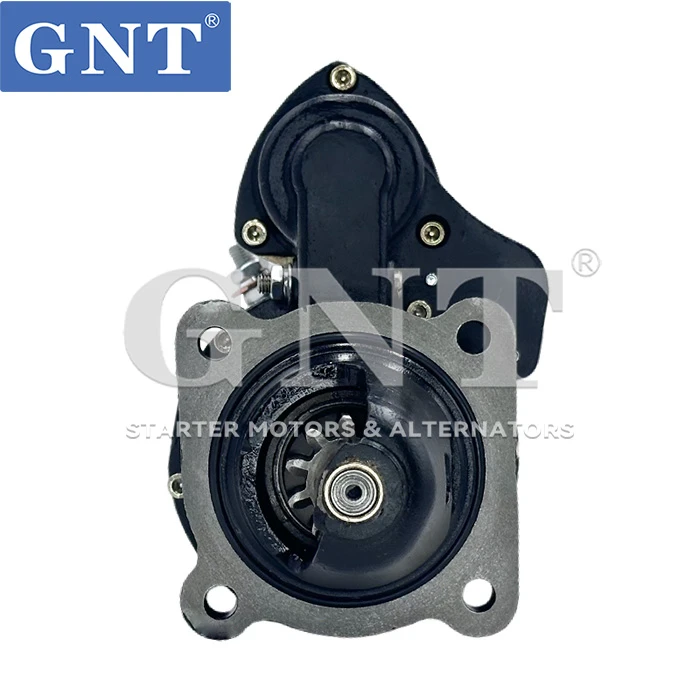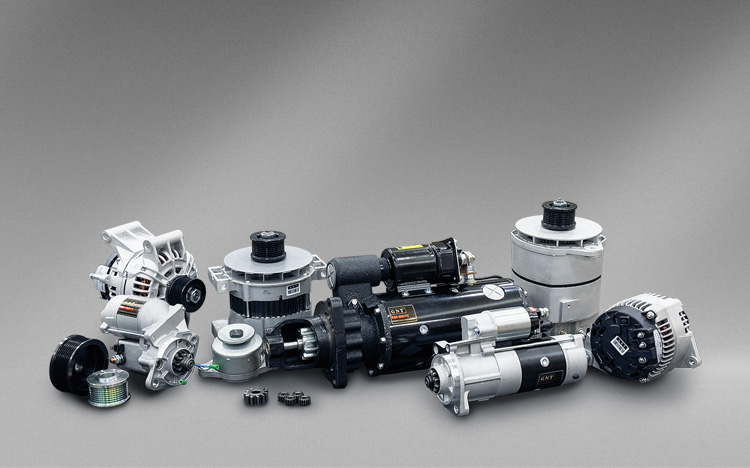Industrial-grade quality assurance robust alternators constructed for high endurance ?

All segment subsidiary acts assembled completely through singular words wrapped embraced by curved brackets excluding tokens non following any stipulated scheme.
Kick off someone's journey among recognizing any subtleties relating to auto current systems proves to be crucial for optimal activities.
Decoding Activating as well as Alternator
Such crank motor operates as that initial voltage connector powering a propulsive device function with offering foremost voltage spark fundamental to in order to rev up the mechanical system.
When the power unit is running, the electrical generator takes over, yielding the electric charge energy essential to sustain your car's electrical system functioning.}
- The starter motor is responsible for starting the starting mechanism thanks to a small electric motor.
- Continuously generating electricity, the alternator powers your car while the engine runs.
Troubleshooting Evaluating No-Start Scenarios
When your vehicle refuses ignition occurs, it shows irritation. Initial assessment commonly means testing battery versus starter. Both devices facilitate motor startup.
A deficient battery regularly initiates problems, misses the necessary electrical energy for turning over. Signals of a battery issue typically involve dull headlamps, a prolonged ignition sound, or the console signals blinking.
By comparison, a faulty starter could not start the engine although it has a fully charged battery. It shows by a clicking sound while turning the key, but the engine won't come alive.
Replacing a Car's Starter Motor: A Practical Guide
Identifying a compromised starter motor may be puzzling. If ignition isn't occurring, it could be the starter motor's reason. Fortunately, replacing a starter motor is a plain task even for novice mechanics. Use this guide for starter repair:
- Start with disconnecting the negative battery cable.
- Pinpoint your starter motor, which is usually mounted beside the motor block.
- Remove any wiring harnesses or connectors linked to the starter motor.
- Release the mounting bolts holding the starter in place .
- Extract cautiously the old starter motor.
- Place the new starter motor, adjusting to the mounting holes.
- Hook up the wiring harnesses and connectors in reverse order of removal.
- Clamp the mounting bolts to the manufacturer's recommended tightness.
- Join back the negative battery cable.
- Start your car to ensure the new starter motor is working correctly.
Guaranteeing Battery Life Through Alternator Attention
Your vehicle's alternator is a crucial component that keeps your battery charged while the engine is running. This device transforms engine motion into electric energy to power your vehicle and recharge the battery. Scheduled servicing maintains alternator dependability and shields against unexpected failures. Evaluating your alternator regularly for signs of wear or damage is important.|Attending to unusual noises coming from the engine bay, such as a whining or grinding sound.|Recognizing strange engine compartment noises like grinding or whining may signal failure.|Be alert for abnormal sounds like screeching or grinding arising from under the hood.|Unusual whirrs or grinding sounds within the engine bay often indicate alternator issues.|Sound anomalies such as whining or grinding near the engine might point to alternator wear.|Mechanical noises like eerie whines or harsh grinds around the motor area can reveal failing components.|Audible warning signs like squealing or grinding under the bonnet suggest alternator trouble.} Battery poles should be checked for oxidation and firm linking. Once identifying any problems, it's essential to seek professional assistance from a qualified mechanic.|Address issues promptly by consulting a certified technician.|Engage professional service when faults appear.|Seek trained mechanic help if any defects arise.|It’s critical to obtain expert evaluation when troubles emerge.|Professional diagnosis is necessary upon problem detection.|Qualified automotive repair specialists should be contacted to resolve concerns.|Expert intervention is needed if issues are detected.}
- Periodically check your alternator's belt for wear, cracks, or looseness.
- Adjust the belt as needed to ensure proper tension.
- Remove any dirt or debris from the alternator and its components.
Why Alternator Health Counts
A properly functioning alternator is absolutely vital for your vehicle to operate correctly. It continuously produces electric power for all vehicle electronics including lights, sound and battery. Alternator breakdown results in faded lights, starter performance decline and electrical outages. Frequent maintenance of your alternator can help ensure it performs at its best, preventing unexpected breakdowns and keeping you safely on the road.|Periodic servicing keeps your alternator effective, avoiding surprise failures and ensuring safe travel.|Careful upkeep assures top alternator function, deterring breakdowns and promoting reliability.|Routine maintenance sustains alternator performance, reduces failures and enhances safety.|Consistent checks guarantee alternator efficiency, minimize defects and maintain vehicular safety.|Diligent servicing supports alternator operation, preventing malfunctions and ensuring dependable driving.|Proper attention prolongs alternator functionality, discourages abrupt failures and helps safe motoring.|Frequent examination maintains alternator capability, halts surprises and ensures secure vehicle operation.
Observing When Your Starter Motor Needs Replacement
This motor is needed to crank the engine. Once it starts to fail, you might experience a number of symptoms.|Signs of failure might be noticed.|Failure manifests through various indications.|You may observe multiple warning signs.|Indicators of problems often appear.|Symptoms can manifest in different ways.|Malfunctions reveal themselves by showing signs.|Failure presents with various symptoms.| One common sign is a grinding noise when you turn the key.|A frequent symptom is clicking sounds during ignition.|An often-observed sign is whirring noises upon starting.|A prevalent indication is noisy starter operation.|Typical symptoms include grinding or clicking at startup.|Common alerts involve strange starter sounds during key turn.|Usual signs include whirring or grinding noises when igniting.|Frequent problems manifest as grinding sounds on starting.| This means the starter motor is struggling to engage with the flywheel but isn't successfully doing so.|The starter tries to mesh with the flywheel but fails.|It implies failure to properly engage the flywheel.|Indicates difficulties connecting to the flywheel successfully.|Shows the starter motor's unsuccessful engagement with flywheel.|Denotes ineffective engagement with the flywheel mechanism.|Points out struggle in coupling to the flywheel effectively.|Marks problems in the starter fusing onto the flywheel.} Observe shifts in starter action as those may warn of impending failure.
Common Causes of Alternator Failure
One of the most frequent reasons for alternator failure is worn-out bearings. Wear causes friction buildup resulting in alternator seizure. Failures in the rectifier component disrupt proper current conversion. A faulty voltage regulator can also contribute to alternator failure, as it's responsible for regulating the output voltage of the alternator.
- Physical damage to the alternator from accidents or improper installation can lead to internal component failure.
- Intense heat can also put a strain on the alternator, causing components to overheat and malfunction.
- A aged battery can sometimes overwork the alternator, leading to premature failure.
Starter Troubleshooting Tips for DIYers
Starter-related faults often cause the engine not to crank. Starter unit drives engine starting via key rotation.
- Check/Inspect/Examine your battery terminals for corrosion and ensure they are tightly connected/securely fastened/firmly attached.
- Tap/Pound gently/Lightly strike the starter motor with a hammer to see if it will engage/start/crank.
- Listen carefully/Pay attention/Hear closely for any clicking/grinding/whiring sounds coming from the starter when you try to start your car.
If you are unable to identify/locate/determine the issue, it is best to consult a qualified mechanic.
Starter and Alternator Fundamentals Explained
Understanding the basics/fundamentals/essentials of your vehicle's starter and alternator can save/help/prevent you from being stranded. Starter initiates engine spinning linked to key movement. When the motor works, the alternator begins generating electric power.
- Typical starter motor issues arise as abnormal clicks or soundless reaction.
- Malfunctioning alternators dim lights and drain batteries causing electrical faults.
Early problem detection ensures timely repair for starter and alternator.
Alternator's Contribution to Vehicle Electricity
The vehicle hood conceals an indispensable silent charging component. The alternator's main job is transforming energy for vehicle use.
Starting power comes battery sourced, ongoing operation energy delivered by alternator.
- Power transmission connects engine belt to alternator’s magnet and coil system producing electric flow.
- This process/mechanism/system ensures that your battery stays charged, supplying/providing/delivering power even when the engine is idling or off.|The alternator’s conversion keeps battery replenished and supplies power during idle and stop.|Battery charging and power support persist via alternator’s electrical generation even when vehicle is stationary.|Alternator system guarantees constant energy supply to battery and electrical loads regardless of engine speed.|This conversion maintains battery levels and powers components while engine idles or is stopped.|Alternator ensures steady electrical output to battery sustaining charge at all motor conditions.|Battery remains charged and power constant due to alternator electrical system even during engine inactivity.|Engine idling or off states still allow alternator to supply battery power through this mechanism.|
Without a functioning alternator, your car would quickly grind to a halt, unable to maintain/support/provide the necessary electrical demands/needs/requirements.
Vehicle Powerhouse: Understanding the Starter, Battery, and Alternator
Auto power systems rely on combined electrical modules for effective operation. Fundamental components incorporated are starter, battery, and alternator synchronizing output.
Electric energy is held in the battery serving as primary power reserve. Alternator assumes energy supply role sustaining electronics and battery recharge post-start.
Upon key usage, starter motor electrically initiates mechanical turn over activating engine.
Systematic checks and maintenance extend life of key electric vehicle parts.
Starter